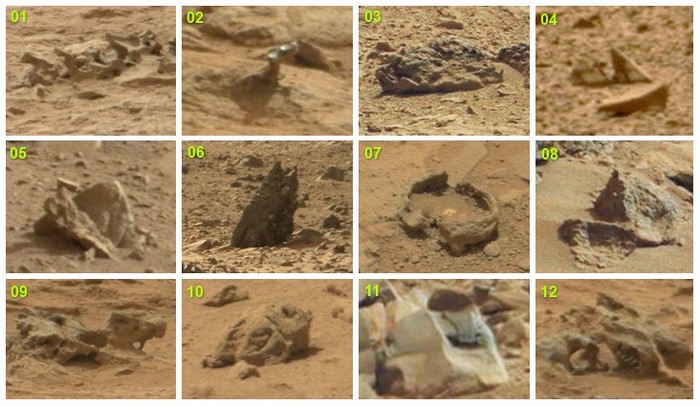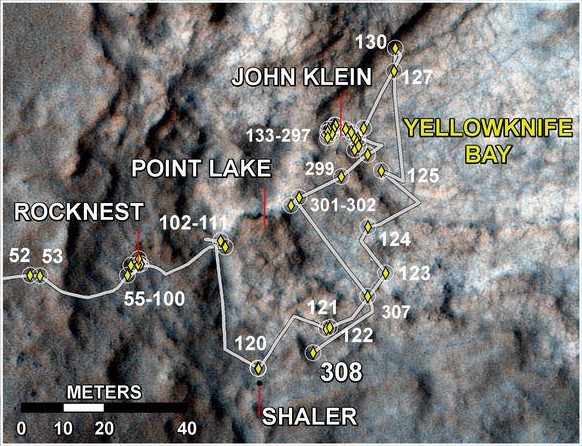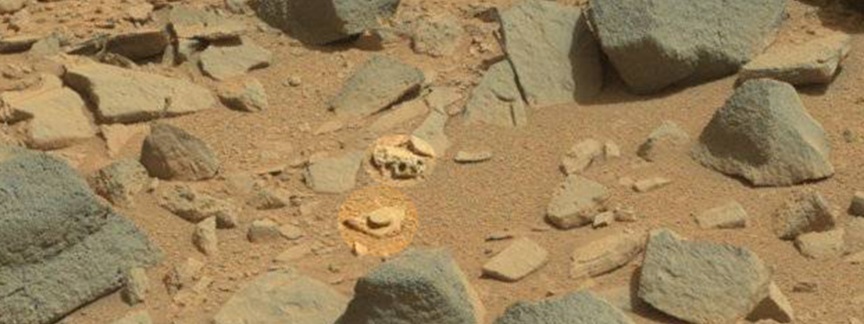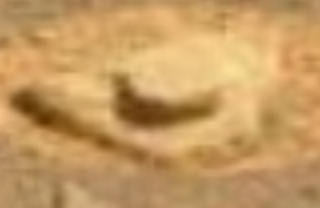It looks like you're using an Ad Blocker.
Please white-list or disable AboveTopSecret.com in your ad-blocking tool.
Thank you.
Some features of ATS will be disabled while you continue to use an ad-blocker.
share:
Now that Curiosity is headed for Mt. Sharp one has good reasons to ask: was she really 'curious' enough over the past months at Glenelg? Sounds
ironic, I know, but it's a serious question! Even more so because my conspiracy alarm went off twice last week. Here's why:
1. Curiosity's intermission at Glenelg ended without any analysis of potential 'anomalies'
2. NASA/JPL announced the new Mars Rover for 2020 will look for 'past life' on the red planet
I have to scratch my head! Let me explain ...
Regarding #1: Over the past months, various members here on ATS identified countless terrain features in MSL imagery that looked either 'out of place', geometrical, artificial, simply 'anomalous' or otherwise intriguing and threads were started getting pretty much attention & lots of replies. Here goes a small selection of some of these features:

Click on the number for related posts/threads with more information:
01 | 02 | 03 | 04 | 05 | 06 | 07 | 08 | 09 | 10 | 11 | 12
Now the point is this: not a single one of these formations had been inspected more in detail: no MAHLI close-ups were acquired, there's no related ChemCam result we know of and I suspect the science team will argue that these features are all part of sedimentary layers or igneous rocks the consistencies of which are known - no need to inspect any further.
BUT: I also suspect some of it had indeed been imaged & analyzed - behind our backs! Why? Well, now I'll be repeating some of my earlier arguments, but they fit well into this context:
1. Even if these features were purely geological in nature and we found something like that on Earth, it would be of great interest. Finding such shapes on Mars should be even more of a miracle. Let's not forget: really complex ventifacts on Earth are quite rare and only occur in very few places. Even in the case of other scientific 'priorities', close-up images of these formations (that clearly stand out) wouldn't have been a problem since Curiosity was right next to them over an extended period of time.
2. One of the above features ('Hugo') attracted considerable attention on popular channels & media. It was only after that 'stir' that NASA/JPL reacted. And what did they do? Well, as if they had been prepared for a case like that, they immediately published a PDF explaining the feature away as a ventifact. No further analysis, no close-ups, no ChemCam checking. End of discussion, voilà!
3. Curiosity spent almost an entire year with this 'intermission': that means there was more than enough time to image those features and I believe that's exactly what NASA/JPL did - but, of course, without publishing the results.
If you look at the traverse map below you can see that Curiosity even went back to the area inbetween Shaler & Point Lake after Sol 301. That's where features No. 1, 7, 9 and 12 are located. Close-ups could have easily been acquired (and probably have been), yet there are no such images available - which is interesting to say the least ...

(continues in next post ...)
1. Curiosity's intermission at Glenelg ended without any analysis of potential 'anomalies'
2. NASA/JPL announced the new Mars Rover for 2020 will look for 'past life' on the red planet
I have to scratch my head! Let me explain ...
Regarding #1: Over the past months, various members here on ATS identified countless terrain features in MSL imagery that looked either 'out of place', geometrical, artificial, simply 'anomalous' or otherwise intriguing and threads were started getting pretty much attention & lots of replies. Here goes a small selection of some of these features:

Click on the number for related posts/threads with more information:
01 | 02 | 03 | 04 | 05 | 06 | 07 | 08 | 09 | 10 | 11 | 12
Now the point is this: not a single one of these formations had been inspected more in detail: no MAHLI close-ups were acquired, there's no related ChemCam result we know of and I suspect the science team will argue that these features are all part of sedimentary layers or igneous rocks the consistencies of which are known - no need to inspect any further.
BUT: I also suspect some of it had indeed been imaged & analyzed - behind our backs! Why? Well, now I'll be repeating some of my earlier arguments, but they fit well into this context:
1. Even if these features were purely geological in nature and we found something like that on Earth, it would be of great interest. Finding such shapes on Mars should be even more of a miracle. Let's not forget: really complex ventifacts on Earth are quite rare and only occur in very few places. Even in the case of other scientific 'priorities', close-up images of these formations (that clearly stand out) wouldn't have been a problem since Curiosity was right next to them over an extended period of time.
2. One of the above features ('Hugo') attracted considerable attention on popular channels & media. It was only after that 'stir' that NASA/JPL reacted. And what did they do? Well, as if they had been prepared for a case like that, they immediately published a PDF explaining the feature away as a ventifact. No further analysis, no close-ups, no ChemCam checking. End of discussion, voilà!
3. Curiosity spent almost an entire year with this 'intermission': that means there was more than enough time to image those features and I believe that's exactly what NASA/JPL did - but, of course, without publishing the results.
If you look at the traverse map below you can see that Curiosity even went back to the area inbetween Shaler & Point Lake after Sol 301. That's where features No. 1, 7, 9 and 12 are located. Close-ups could have easily been acquired (and probably have been), yet there are no such images available - which is interesting to say the least ...

(continues in next post ...)
edit on 14-7-2013 by jeep3r because: text
(... continued)
4. NASA/JPL frequently stated that the MSL images are uploaded to the public archives. What they usually don't mention is that this process is not 'direct' or 'real-time' in nature. Of course, the science team gets the images first. And they need to approve them (after analysis) before they go into the public archives. In theory (and probably in practice, too) certain images can thus be held back indefinitely for the purpose of further investigation.
5. Remember Grotzinger's famous proclamation ('One For The History Books'), after some new data came in when he was interviewed by journalists? And what happened? They 'pulled' him back and suggested to rephrase the statement, which he then did a few days later:
6. Was Curiosity's visit to Glenelg really just an 'intermission'? A deviation from the official plan as stated by NASA/JPL? Curiosity landed just about 400m away and went straight into that area encountering a whole variety of strange formations!? Didn't MRO data already indicate from orbit that this area consisted of mineral rich layers & deposits as well as other interesting - probably unique - signatures? After almost one year into the mission, I do have to speculate and ask: why exactly was it declared an intermission after all? Didn't it rather look like a major part of the overall-mission?

Regarding #2: So the 2020 rover will look for 'past life'? On a microscopic scale, right? Well, I suspect that will exclude the possibility of finding anything to prove 'past life' on a larger scale? You know, it all starts to sound like the result of a preconceived plan suggesting predefined goals AND a meticulously 'planned' public information policy ...
... that's why Curiosity won't (!) find anything 'earth-shaking', as Grotzinger's words suggested, it just wouldn't fit into the overall agenda and gives certain people at NASA/JPL more time to keep concealing what they probably already know. That's not to 'belittle' the amazing science results Curiosity & the team achieved up to now but there was almost certainly much more to see and do at Glenelg than just that.
For the above reasons I suspect that: as long as we're talking about microbes & bacteria the 'official information policy' will allow to gradually release related information. As for anything else with regards to 'past life' it would be subject to concerns first mentioned in the Brookings report commissioned by NASA in 1960 (same as for UFOs). Here an excerpt regarding 'information policy' in the event of the discovery of intelligent life elsewhere in the universe:
/emphasis added/
The 'issue' is this: the report suggests further study on reactions & behaviour of leaders and cultures with regards to such a discovery. To make a long story short: it's a complex subject and the arising questions couldn't be answered at this point in time, there are too many uncertainties involved so why bother taking the risk? IMO it's therefore not unreasonable to assume that the US government & NASA/JPL want to play it safe and rather 'control' every bit of information that goes out.
All of the above is quite provocative, I know, and I really hope I'm wrong with my 'speculation' that we're not being told everything. But I fear there are considerable indications that important information is being withheld ...
Thanks for your patience & attention!
_______
PLEASE NOTE: As for the possibility of there being potential 'artifacts' on Mars, let's not forget about (a) the overall dust cover which makes the surface look 'coherent', (b) the low erosion rates throughout the Amazonian period on Mars and (c) the fact that any such remains (as would be true for the Moon, too) must not necessarily be linked to intelligent life that originated from Mars.
P.S.: Mods - please feel free to move this to ATS Skunkworks if more appropriate
4. NASA/JPL frequently stated that the MSL images are uploaded to the public archives. What they usually don't mention is that this process is not 'direct' or 'real-time' in nature. Of course, the science team gets the images first. And they need to approve them (after analysis) before they go into the public archives. In theory (and probably in practice, too) certain images can thus be held back indefinitely for the purpose of further investigation.
5. Remember Grotzinger's famous proclamation ('One For The History Books'), after some new data came in when he was interviewed by journalists? And what happened? They 'pulled' him back and suggested to rephrase the statement, which he then did a few days later:
As for history books, the whole mission is for the history books. That’s not to rule out the possibility of truly big news. It won’t be earthshaking, but it will be interesting.
6. Was Curiosity's visit to Glenelg really just an 'intermission'? A deviation from the official plan as stated by NASA/JPL? Curiosity landed just about 400m away and went straight into that area encountering a whole variety of strange formations!? Didn't MRO data already indicate from orbit that this area consisted of mineral rich layers & deposits as well as other interesting - probably unique - signatures? After almost one year into the mission, I do have to speculate and ask: why exactly was it declared an intermission after all? Didn't it rather look like a major part of the overall-mission?

Regarding #2: So the 2020 rover will look for 'past life'? On a microscopic scale, right? Well, I suspect that will exclude the possibility of finding anything to prove 'past life' on a larger scale? You know, it all starts to sound like the result of a preconceived plan suggesting predefined goals AND a meticulously 'planned' public information policy ...
... that's why Curiosity won't (!) find anything 'earth-shaking', as Grotzinger's words suggested, it just wouldn't fit into the overall agenda and gives certain people at NASA/JPL more time to keep concealing what they probably already know. That's not to 'belittle' the amazing science results Curiosity & the team achieved up to now but there was almost certainly much more to see and do at Glenelg than just that.
For the above reasons I suspect that: as long as we're talking about microbes & bacteria the 'official information policy' will allow to gradually release related information. As for anything else with regards to 'past life' it would be subject to concerns first mentioned in the Brookings report commissioned by NASA in 1960 (same as for UFOs). Here an excerpt regarding 'information policy' in the event of the discovery of intelligent life elsewhere in the universe:
Questions one might wish to answer by such studies would include: How might such information, under what circumstances, be presented to or withheld from the public for what ends?
What might be the role of the discovering scientists and other decision makers regarding release of the fact of discovery?" – pages 183–184
Source (Full PDF)
/emphasis added/
The 'issue' is this: the report suggests further study on reactions & behaviour of leaders and cultures with regards to such a discovery. To make a long story short: it's a complex subject and the arising questions couldn't be answered at this point in time, there are too many uncertainties involved so why bother taking the risk? IMO it's therefore not unreasonable to assume that the US government & NASA/JPL want to play it safe and rather 'control' every bit of information that goes out.
All of the above is quite provocative, I know, and I really hope I'm wrong with my 'speculation' that we're not being told everything. But I fear there are considerable indications that important information is being withheld ...
Thanks for your patience & attention!
_______
PLEASE NOTE: As for the possibility of there being potential 'artifacts' on Mars, let's not forget about (a) the overall dust cover which makes the surface look 'coherent', (b) the low erosion rates throughout the Amazonian period on Mars and (c) the fact that any such remains (as would be true for the Moon, too) must not necessarily be linked to intelligent life that originated from Mars.
P.S.: Mods - please feel free to move this to ATS Skunkworks if more appropriate
edit on 14-7-2013 by jeep3r because: text
reply to post by jeep3r
Absolutely GREAT!

This could be one of the most significative ATS mega-thread of Mars/Curiosity anomalies
No other words, my friend.
S&F.
Absolutely GREAT!

This could be one of the most significative ATS mega-thread of Mars/Curiosity anomalies
No other words, my friend.
S&F.
edit on 14-7-2013 by Arken because: (no reason given)
reply to post by Arken
Thanks a lot, Arken. It just needed to be posted IMO, although I didn't expect NASA/JPL to 'really' leave Glenelg behind without looking into some of the stuff we discussed here on ATS ...
... but obviously, that's exactly what they did
Thanks a lot, Arken. It just needed to be posted IMO, although I didn't expect NASA/JPL to 'really' leave Glenelg behind without looking into some of the stuff we discussed here on ATS ...
... but obviously, that's exactly what they did
edit on 14-7-2013 by jeep3r because: text
reply to post by jeep3r
For sure "they" did it, and for sure they already know at these days.
I don't know why, but the "turning point" could be the 06 August 2013....
For sure "they" did it, and for sure they already know at these days.
I don't know why, but the "turning point" could be the 06 August 2013....
edit on 14-7-2013 by Arken because: (no reason given)
Outstanding thread OP! Good work and very informative. This is not my area of specialty or focus, but this is a thread I'm bookmarking to come back
to later on reference.
reply to post by Arken
.... hmmm, I'm not even sure there'll be a turning point. I'm increasingly under the impression that the game is being played according to a set of rules that has been determined a long time ago.
I further think that Grotzinger's statement gave us a clear indication: There won't be anything 'earth-shaking'! So it shall be ... ! But not because it's all rocks, no way! Rather because of the information policy and - to some extent - I could even understand their 'procedures' if what we theorize here were indeed true.
In other words: I'd be really surprised if NASA/JPL published any MAHLI close-ups of things that look like what's been mentioned in the OP throughout the further course of the mission. I don't like the idea, but I can't fight the feeling that that's gonna be the policy they're adhering to ...
.... hmmm, I'm not even sure there'll be a turning point. I'm increasingly under the impression that the game is being played according to a set of rules that has been determined a long time ago.
I further think that Grotzinger's statement gave us a clear indication: There won't be anything 'earth-shaking'! So it shall be ... ! But not because it's all rocks, no way! Rather because of the information policy and - to some extent - I could even understand their 'procedures' if what we theorize here were indeed true.
In other words: I'd be really surprised if NASA/JPL published any MAHLI close-ups of things that look like what's been mentioned in the OP throughout the further course of the mission. I don't like the idea, but I can't fight the feeling that that's gonna be the policy they're adhering to ...
edit on 14-7-2013 by jeep3r because: text
reply to post by jeep3r
Just an observation, but they did see what we here at ATS discussed (as it was their pictures) and they do understand what everyone saw were in fact rocks.
It is only on a conspiracy forum that people make out rocks to be something other than just rocks..
Thanks a lot, Arken. It just needed to be posted IMO, although I didn't expect NASA/JPL to 'really' leave Glenelg behind without looking into some of the stuff we discussed here on ATS ...
Just an observation, but they did see what we here at ATS discussed (as it was their pictures) and they do understand what everyone saw were in fact rocks.
It is only on a conspiracy forum that people make out rocks to be something other than just rocks..
reply to post by jeep3r
Im with you jeeper. All these strange artifacts in my opinion WILL have been inspected. But THEY try to pull us off by pretending to be doing totally boring experiments of which some of the results were unsurprising anyway!!..
Im with you jeeper. All these strange artifacts in my opinion WILL have been inspected. But THEY try to pull us off by pretending to be doing totally boring experiments of which some of the results were unsurprising anyway!!..
reply to post by tsurfer2000h
Of course, most of us here on ATS are 'just' conspiracists and not geologists, scientists etc. (although there are indeed some academics and knowledgable people around).
But independent of our level of education:
All the things we discussed and highlighted did stand out when compared to the rest. So one might want to ask: why publish TONS of images of apparently feature-less rocks and not some good close-ups of the stuff that creates big discussions? Even if it were 'just' to prove it's nothing but plain rocks ... but they didn't do us that favor and I really wonder why
Of course, most of us here on ATS are 'just' conspiracists and not geologists, scientists etc. (although there are indeed some academics and knowledgable people around).
But independent of our level of education:
All the things we discussed and highlighted did stand out when compared to the rest. So one might want to ask: why publish TONS of images of apparently feature-less rocks and not some good close-ups of the stuff that creates big discussions? Even if it were 'just' to prove it's nothing but plain rocks ... but they didn't do us that favor and I really wonder why
edit on 14-7-2013 by jeep3r because: text
reply to post by jeep3r
If there is really missed opportunities or intentional suppression imagine how history will such incompetence or intentional deception. I too believe that there are questions that can only have one answer and in the end heads should roll or reputations will be destroyed...
If there is really missed opportunities or intentional suppression imagine how history will such incompetence or intentional deception. I too believe that there are questions that can only have one answer and in the end heads should roll or reputations will be destroyed...
I think they didn't examine those "anomalies" more closely because they know them for what they are - ventrifacts and other erosion features. An
interesting rock is still a rock, and devoting time and resources to examining it closely for no reason other than "it looks like an anomaly" would
be a waste.
I have yet to see a geologist or an astronomer / astobiologist raising any issues with NASA's current missions on Mars. So when people on ATS go flapping about concerning these "anomalies", I'm not that bothered.
I have yet to see a geologist or an astronomer / astobiologist raising any issues with NASA's current missions on Mars. So when people on ATS go flapping about concerning these "anomalies", I'm not that bothered.
reply to post by wildespace
But how could it be a waste of time? We're not talking about drilling, SAM analysis or other time-consuming activities. It's more about taking better images/close-ups of formations that were in the vicinity of Curiosity anyway.
It would have perhaps been a short drive, an adjustment of the instrument arm and some snapshots incl. a slightly increased file transfer between Earth & Mars - all that wouldn't be a matter of days or weeks, so the delay would have been essentially 'irrelevant'.
I'd even go further: what about all the other thousands & thousands of feature-less rocks that have been imaged 'close-up'? According to your argument, that would have also been a waste of time, right? Yet it was done, so I think there's more to the obvious omission of these particular 'anomalies' ...
But how could it be a waste of time? We're not talking about drilling, SAM analysis or other time-consuming activities. It's more about taking better images/close-ups of formations that were in the vicinity of Curiosity anyway.
It would have perhaps been a short drive, an adjustment of the instrument arm and some snapshots incl. a slightly increased file transfer between Earth & Mars - all that wouldn't be a matter of days or weeks, so the delay would have been essentially 'irrelevant'.
I'd even go further: what about all the other thousands & thousands of feature-less rocks that have been imaged 'close-up'? According to your argument, that would have also been a waste of time, right? Yet it was done, so I think there's more to the obvious omission of these particular 'anomalies' ...
reply to post by jeep3r
And why would they need to do anybody any favors?
Here you go a good example of things that are just rocks, but are interpreted as something else...
A supposed triangular structure.

and was discussed here....
www.abovetopsecret.com...
Now lets look at the same picture up close...

It is neither a triangle or structure, but it is a rock.
Do you see where I am going here?
You see the mind works in mysterious ways...
Btw they are still just rocks...
why publish TONS of images of apparently feature-less rocks and not some good close-ups of the stuff that creates big discussions? Even if it were 'just' to prove it's nothing but plain rocks ... but they didn't do us that favor and I really wonder why
And why would they need to do anybody any favors?
Here you go a good example of things that are just rocks, but are interpreted as something else...
A supposed triangular structure.

and was discussed here....
www.abovetopsecret.com...
Now lets look at the same picture up close...

It is neither a triangle or structure, but it is a rock.
Do you see where I am going here?
You see the mind works in mysterious ways...
Btw they are still just rocks...
I don't like "all I see is rocks" people...even if they are right...it shows a clear lack of imagination. Even more, not all curious pics...even
look like plain rocks to begin with...yet..."all they see is rocks"...because...helloouuuuu...it's mars...there is nothing there so it must be
rocks
If they had their way...we wouldn't be going to Mars or anywhere else...because there is nothing out there...obviously...they were told.
If they had their way...we wouldn't be going to Mars or anywhere else...because there is nothing out there...obviously...they were told.
Originally posted by jeep3r
I'd even go further: what about all the other thousands & thousands of feature-less rocks that have been imaged 'close-up'? According to your argument, that would have also been a waste of time, right? Yet it was done, so I think there's more to the obvious omission of these particular 'anomalies' ...
Because the people that are qualified saw something in them that they thought was worth looking at. The rovers have a limited lifespan, and are slow, so if they drove to every anomaly to examine it up close, they would burn their mission time, and life cycle of the rover, for what would probably be little return.
reply to post by jeep3r
Wow, fantastic work! Mindboggingly well structured and presented. Let's hope Curiosity drives to disclosure!. The cat needs to be let out of the bag. No killing the cat!
Wow, fantastic work! Mindboggingly well structured and presented. Let's hope Curiosity drives to disclosure!. The cat needs to be let out of the bag. No killing the cat!
First off, to be fair; I typically look at the so called "Mars Anomaly" threads and decide(without ever posting mind you) "it's just rocks". Not
always though, but most times (over 98% of the time).
Having said that:
I wanted to say that the OP made a great thread with a (imho) valid argument. I am not saying that tptb / NASA / JPL whatever are in fact hiding data from the public; but they sure as heck could be.
I don't think that it's too farfetched to ponder that some data is syphoned off before even being presented to civilian scientists involved with the mission that is publicly known.
The entire transmission could be intercepted and "filtered" and none of us would know it. What's more, the conspiracy theorist inside me says that strange situations, like the "intermission", or that one scientists later "rephrased" comments, are reason to question what is really going on.
Also, just recently a thread was created here on ATS regarding NASA/JPL scientists leaving due to forced security clearance requirements.....
That too makes my inner conspiracy theorist wonder. And when looking at that, mixed with this threads supposition, I have to really ponder what's going on.
Anyways, I'm not saying for sure they are hiding or intercepting anything. But I say it is damn possible and this ;is a great thread.
X
Having said that:
I wanted to say that the OP made a great thread with a (imho) valid argument. I am not saying that tptb / NASA / JPL whatever are in fact hiding data from the public; but they sure as heck could be.
I don't think that it's too farfetched to ponder that some data is syphoned off before even being presented to civilian scientists involved with the mission that is publicly known.
The entire transmission could be intercepted and "filtered" and none of us would know it. What's more, the conspiracy theorist inside me says that strange situations, like the "intermission", or that one scientists later "rephrased" comments, are reason to question what is really going on.
Also, just recently a thread was created here on ATS regarding NASA/JPL scientists leaving due to forced security clearance requirements.....
That too makes my inner conspiracy theorist wonder. And when looking at that, mixed with this threads supposition, I have to really ponder what's going on.
Anyways, I'm not saying for sure they are hiding or intercepting anything. But I say it is damn possible and this ;is a great thread.
X
We can argue about whether we see rocks or not, but I think you are onto something with Rotzinger speech.
I honestly expected him to have chalk or lime- signifying previous life. I even checked the chemical analyzer to see if there were further clues. In the end the announcement turned out to be a damp squib.
I honestly expected him to have chalk or lime- signifying previous life. I even checked the chemical analyzer to see if there were further clues. In the end the announcement turned out to be a damp squib.
Originally posted by Zaphod58
Originally posted by jeep3r
I'd even go further: what about all the other thousands & thousands of feature-less rocks that have been imaged 'close-up'? According to your argument, that would have also been a waste of time, right? Yet it was done, so I think there's more to the obvious omission of these particular 'anomalies' ...
Because the people that are qualified saw something in them that they thought was worth looking at. The rovers have a limited lifespan, and are slow, so if they drove to every anomaly to examine it up close, they would burn their mission time, and life cycle of the rover, for what would probably be little return.
Great reply. I'd also add that what may look featureless and boring to you might provide valuable clues to scientists about martian environment and its geological past. Curiosity is up there to do science, not to enterntain the public with pictures of weird rocks.
This thread smacks of ignorance.
new topics
-
Only two Navy destroyers currently operational as fleet size hits record low
Military Projects: 2 hours ago -
George Stephanopoulos and ABC agree to pay $15 million to settle Trump defamation suit
Mainstream News: 8 hours ago
top topics
-
George Stephanopoulos and ABC agree to pay $15 million to settle Trump defamation suit
Mainstream News: 8 hours ago, 17 flags -
Light from Space Might Be Travelling Instantaneously
Space Exploration: 15 hours ago, 9 flags -
The MSM has the United Healthcare assassin all wrong.
General Conspiracies: 16 hours ago, 8 flags -
More Bad News for Labour and Rachel Reeves Stole Christmas from Working Families
Regional Politics: 14 hours ago, 8 flags -
2025 Bingo Card
The Gray Area: 16 hours ago, 7 flags -
Only two Navy destroyers currently operational as fleet size hits record low
Military Projects: 2 hours ago, 6 flags
active topics
-
Nov 2024 - Former President Barack Hussein Obama Has Lost His Aura.
US Political Madness • 15 • : WeMustCare -
Former DNI-Congressman John Ratcliffe says the U.S. Government is Intimidated by UFOs.
Aliens and UFOs • 41 • : WeMustCare -
The Mystery Drones and Government Lies
Political Conspiracies • 71 • : cherokeetroy -
-@TH3WH17ERABB17- -Q- ---TIME TO SHOW THE WORLD--- -Part- --44--
Dissecting Disinformation • 3683 • : duncanagain -
One out of every 20 Canadians Dies by Euthanasia
Medical Issues & Conspiracies • 23 • : Daughter2v2 -
Drones everywhere in New Jersey
Aliens and UFOs • 165 • : Zaphod58 -
Mass UAP events. DC. Machester Airport, UFOs over sub base in CT, Nuke bases.
Aliens and UFOs • 57 • : WeMustCare -
FBI Director CHRISTOPHER WRAY Will Resign Before President Trump Takes Office on 1.20.2025.
US Political Madness • 26 • : WeMustCare -
George Stephanopoulos and ABC agree to pay $15 million to settle Trump defamation suit
Mainstream News • 10 • : WeMustCare -
President-Elect DONALD TRUMP's 2nd-Term Administration Takes Shape.
Political Ideology • 330 • : WeMustCare
